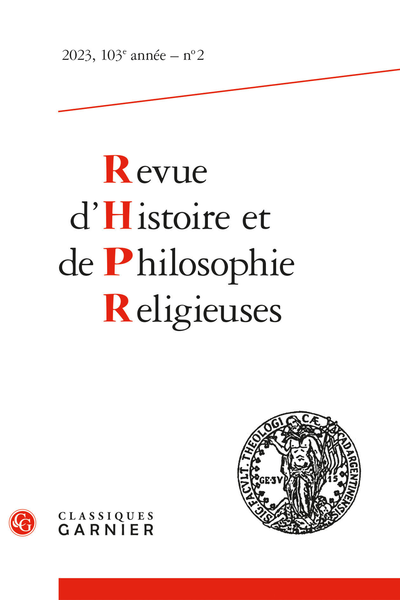
Résumés
- Type de publication : Article de revue
- Revue : Revue d'histoire et de philosophie religieuses
2023 – 2, 103e année, n° 2. varia - Pages : 119 à 121
- Revue : Revue d'Histoire et de Philosophie religieuses
- Thème CLIL : 4046 -- RELIGION -- Christianisme -- Théologie
- EAN : 9782406151340
- ISBN : 978-2-406-15134-0
- ISSN : 2269-479X
- DOI : 10.48611/isbn.978-2-406-15134-0.p.0119
- Éditeur : Classiques Garnier
- Mise en ligne : 12/07/2023
- Périodicité : Trimestrielle
- Langue : Français
Résumés/Abstracts
Gerd Theissen, « Trois projets herméneutiques innovants. R. Bultmann, M. Dibelius et E. Lohmeyer »
Entre 1927 et 1933, Bultmann, Dibelius et Lohmeyer publient chacun un article dans la RHPR. Ces trois exégètes du Nouveau Testament développent des programmes herméneutiques innovants complémentaires : la démythologisation (Bultmann), inspirée de la philosophie de l’existence de Heidegger ; la signification sociale de l’Évangile (Dibelius), en lien avec la philosophie de la vie de Nietzsche ; l’interprétation croyante et scientifique du mythe (Lohmeyer), fondée sur le néokantisme de Hönigswald.
Mots-clés : Rudolf Bultmann, Martin Dibelius, Ernst Lohmeyer, Martin Heidegger, Friedrich Nietzsche, Richard Hönigswald, néo-kantisme, Nouveau Testament, philosophie de la vie, philosophie de l’existence.
Gerd Theissen, “Three innovative hermeneutic Projects. R. Bultmann, M. Dibelius and E. Lohmeyer”
Between 1927 and 1933, Bultmann, Dibelius and Lohmeyer each published an article in the RHPR. These three New Testament exegetes developed complementary innovative hermeneutical programmes: demythologisation (Bultmann), inspired by Heidegger ’ s philosophy of existence; the social significance of the Gospel (Dibelius), linked to Nietzsche ’ s philosophy of life; and the believing and scientific interpretation of myth (Lohmeyer), based on Hönigswald ’ s neo-Kantianism.
Keywords: Rudolf Bultmann, Martin Dibelius, Ernst Lohmeyer, Martin Heidegger, Friedrich Nietzsche, Richard Hönigswald, neo-Kantianism, New Testament, philosophy of life, philosophy of existence.
Édouard Mehl, « Héring et le tournant phénoménologique de la théologie au miroir de la RHPR (1919-1939) »
Prenant à rebours un débat qui agite les historiens de la phénoménologie depuis environ trente ans, cet article veut montrer que l’évolution théologique de la phénoménologie dans les dernières décennies a été en fait précédée et devancée par une conversion de la théologie à la 244phénoménologie, au moment où, dans les ruines de la Grande Guerre, cette théologie se cherchait un appui qu’elle ne pouvait trouver ni, en Allemagne, dans le (néo)kantisme, ni, en France, dans le spiritualisme bergsonien.
Mots-clés : Husserl, phénoménologie, théologie protestante, Strasbourg, Jean Héring, religion, Erlebnis.
Édouard Mehl, “Hering and the Phenomenological Turn in Theology as Seen in the RHPR (1919-1939)”
Working backwards in a debate which has preoccupied historians of phenomenology for about thirty years, this article aims to show that the theological evolution of phenomenology in recent decades was in fact preceded and anticipated by a conversion of theology to phenomenology, at the very moment when, in the aftermath of World War I, this theology was looking for a frame of reference which it found neither in (neo-)Kantianism in Germany nor in Bergsonian spiritualism in France.
Keywords: Husserl, phenomenology, Protestant theology, Strasbourg, Jean Héring, religion, Erlebnis.
Stefan Michels, « Penser tous les possibles en musique… Albert Schweitzer et Jean-Sébastien Bach »
L’esthétique musicale d’Albert Schweitzer représente une avancée importante. Elle est toutefois souvent dévalorisée aujourd’hui comme étant « pré-scientifique ». Elle est reconsidérée ici d’un point de vue théologique, au regard de l’œuvre vocale sacrée de J.-S. Bach. Bien qu’elle ne corresponde pas aux critères actuels de la recherche en histoire de la musique, elle recèle des propositions d’interprétation qui enrichissent de manière multidimensionnelle la compréhension de cette œuvre.
Mots-clés : Albert Schweitzer, J.-S. Bach, esthétique musicale, recherche théologique sur Bach, recherche sur la musique baroque, philosophie de la musique, recherche musicale théologique.
Stefan Michels, “Thinking of All Possibilities in Music… Albert Schweitzer and Johann Sebastian Bach”
Albert Schweitzer ’ s musical aesthetic represents an important advance. It is, however, often devalued today as “pre-scientific”. We reconsider it here from a theological point of view, with regard to the sacred vocal works of J. S. Bach. Although it does not correspond to the current criteria of music historical research, it contains interpretative 245 proposals which enrich the understanding of this corpus in a multidimensional way.
Keywords: Albert Schweitzer, J. S. Bach, music aesthetics, theological Bach research, baroque research, music philosophy, theological music research.
Bérénice Palaric, « Notes & Documents. Le centenaire de la mort d’Ernst Troeltsch (Congrès de Berlin, 2023) »
Pour célébrer le centenaire de la mort du théologien, sociologue et philosophe, le 1er février 1923, le 13e Congrès international de la Société Ernst Troeltsch s’est tenu à Berlin du 23 au 25 février et a porté sur le thème « Coexistence et interdépendance : la religion, la culture et la politique ». Cet article revient sur les différentes interventions et évènements commémoratifs organisés à cette occasion.
Mots-clés : Ernst Troeltsch, christianisme, historisme, démocratie, Les Doctrines sociales, européanisme, ascèse, Augustin, Hans Joas.
Bérénice Palaric, “Notes & Documents. The Centenary of Ernst Troeltsch’s Death (Berlin Congress, 2023)”
To celebrate the centenary of the death of the theologian, sociologist and philosopher on 1 February 1923, the 13 th International Congress of the Ernst Troeltsch Society was held in Berlin from 23 to 25 February on the theme of “Coexistence and Interdependence: Religion, Culture and Politics”. This article looks at the various speeches and commemorative events organised on this occasion.
Keywords: Ernst Troeltsch, Christianity, historicism, democracy, The Social Doctrines, Europeanism, asceticism, Augustine, Hans Joas.